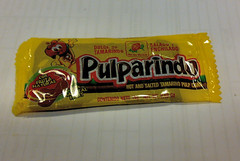
So, bought this while I was over in Mexico (it being manufactured there), thought I would bring it back into the office for people have a little go of (if they were brave), it being described as a "Hot and Salted Tamarind Pulp Candy" it seemed like it might be interesting...quite a few people did have a go (after I did) only one refusing point-blank, and the (by far) most popular description of the taste was "Oh, it tastes like Dates", followed immediately by "...and it's a bit salty...", and then "...and there's a bit of fire there too"...(mostly as it said on the packet, but) I was suprised at quite how fruity it was, for me I got about half dried dates, half sultana, (plus the after-zing) which persisted for a good 5 minutes after eating (even only a tiny little taste of) it...perhaps a *little* hardcore to be referred to as "candy" in the UK though... ;)
One American colleague said - "Mmmm...this tastes exactly like Fruit Roll, do you guys have Fruit Roll over here?"...but no-one had any idea what she was talking about...another thing to try perhaps... ;)

3 comments:
it can't be "candy" if it doesn't have chocolate in it!... or is that just my opinion? ;)
California Department of Public Health Warns Consumers Not to Eat De La Rosa Pulparindo Candy
Contact:
Suanne Buggy or Lea Brooks
916-440-7259
FOR IMMEDIATE RELEASE -- Sacramento, CA -- July 20, 2007 -- California Department of Public Health (CDPH) Director Dr. Mark Horton today warned consumers not to eat De La Rosa Pulparindo candy imported from Mexico after tests conducted by CDPH found high levels of lead that could cause health problems. Eating lead-contaminated candy is particularly harmful to infants, young children and pregnant women. Consumers in possession of this product should discard it.
"Lead is toxic to humans, especially infants, young children and developing fetuses, and can result in learning disabilities and behavioral disorders that could last a lifetime," Horton said. "Today's warning is part of our ongoing efforts to ensure the safety of foods sold in California."
De la Rosa Pulparindo is a tamarind pulp candy packaged in 10-ounce boxes that contain individually wrapped 0.49 ounce candies. The 10-ounce boxes are bright red in color with the word "Pulparindo" boldly printed in black letters. The individual candy packages are also bright red in color with the word "Pulparindo" boldly printed in black letters and "Extra Hot and Salted Tamarind Pulp Candy" boldly printed in yellow lettering with green trim located underneath the word "Pulparindo."
Dul-Mex Guadalajara Inc. of Hayward, the distributor where the De La Rosa Pulparindo was sampled, has initiated a voluntary recall of the product and is working with CDPH to ensure that all products still in commerce are promptly removed. CDPH is working to identify any other California distributors that might also sell De La Rosa Pulparindo in an effort to ensure that the product is removed from store shelves statewide.
According to a recent analysis by CDPH, the candy contained between 0.12 and 0.18 parts per million (ppm) of lead. California considers candies with lead levels in excess of 0.1 ppm adulterated. This level is consistent with guidance issued by the U.S. Food and Drug Administration in November 2006 on the recommended maximum lead level of 0.1 ppm in candy products likely to be consumed by children.
Assembly Bill 121, signed by Governor Arnold Schwarzenegger in 2006, provided additional resources to CDPH so more testing of candy can be conducted to ensure these products are not adulterated with lead and other contaminants.
Pregnant women and parents of children who may have consumed any of the above mentioned candy should consult with their physician or health care provider to determine if further medical testing is warranted. For more information about lead poisoning, parents and caretakers should contact their local childhood lead poisoning prevention program or local public health department. Additional information and a list of local childhood lead prevention programs are available at CDPH's Web site at http://www.dhs.ca.gov/childlead.
The public is encouraged to report any sellers of the candy by calling CDPH's complaint hotline at 1-800-495-3232.
Phew, glad mine wasn't one of those! :)
Post a Comment